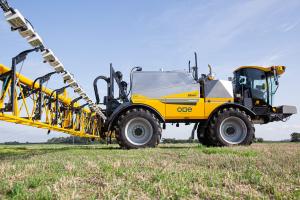Halfway through: a unique AI and smart farming technology project tackling the biggest weed issue in UK agriculture
One of the first Smart Spraying farming projects developed to tackle a specific weed problem
DENHAM, UK, June 5, 2024 /EINPresswire.com/ -- Ahead of its attendance at the Cereals Event at Newnham Farm on 11th and 12th June, Bosch is marking almost two years of successes for an innovative AI-led project, set to revolutionise the management of harmful weeds and support the UK farming industry.A team of experts from Bosch, BASF Digital Farming, Chafer Machinery and Rothamsted Research have successfully reached the midway point of developments, in a three-year project that will develop the use of precision farming technology and artificial intelligence to help reduce the persistent problem of black-grass in UK farms.
Black-grass (alopecurus myosuroides) is a weed that inhibits the growth of wheat crops, reducing its yield and damaging the productivity of farms. This weed alone represents a real threat to the sustainability of UK cereal production because it is responsible for up to 800,000 tons of UK wheat losses a year, with subsequent economic losses of around £400 million*.
Bosch is the lead partner in the research and development (R&D) project consortium, which comprises recognised experts from BASF Digital Farming, Chafer Machinery, and Rothamsted Research. Together they were awarded a grant of £1,452,614 for the three-year project from DEFRA and Innovate UK, the UK’s innovation agency, under the Farming Innovation Programme – Small R&D Partnership Projects.
The consortium has been specifically designed to leverage world-class capabilities from academia (Rothamsted) and the technological expertise of Bosch, BASF and Chafer to design a bespoke solution to eliminate the problem of black-grass for UK farmers.
Halfway through -
This project is a first of its kind. It enables UK SME Chafer to use the Bosch/BASF ‘ONE SMART SPRAY’ precision weed management technology to develop, build and evaluate a camera-equipped self-propelled sprayer for black-grass mapping and precision patch- or spot-spraying.
The AI used to identify weeds and the ability to generate precise weed maps allows Rothamsted to define appropriate agronomic measures and variable rate herbicide applications, using the agronomic logic and intelligence of BASF Digital Farming’s advanced xarvio Digital Farming Solutions crop optimisation platform.
Over one year in and at the midway point, the project team is training a high precision artificial intelligence (AI) based Bosch model to recognise black-grass in a greenhouse environment, and is close to completing phase 1 development of a prototype for use in the fields. In addition, the data capture has been enhanced by installing cameras on a sprayer, which is then able to capture and record high quality images of weed growth as it moves through the crops. For Bosch, this has meant recruiting data and software engineer who is an expert at collecting and analysing the data and images. The image labelling is done by blackgrass experts from Rothamsted Research institute.
As the project progresses, weekly scanning takes place across key growing seasons and the field data generated is used to develop granular black-grass maps. Agronomic recommendations then focus on the development of an integrated weed management plan across the farm.
The Chafer sprayer has developed through the project. It began with 12 cameras and 24 lights, which were used in the initial stages of the project on a small section of the boom as the team established the optimum set-up of lights and cameras. This has now been defined and replicated with 30 cameras and 60 lights that stretch across the full width of the boom.
Bharath Jayakumar, Innovation Lead at Bosch UK, said: “In the UK, black-grass is seen as one of the biggest issues for farmers. If we are able to address the black-grass challenge, it will be beneficial to the environment, our ecosystem, the soil, the crops – and also to all of us as end users of the product.
“We’re already seeing first-hand the possibilities with this project, proving that our sensor, software and AI technology can make a difference for UK farmers and will help them to target black-grass better in their fields. In future we can also look at other economically important grassweeds such as Ryegrass.”
Funding for the unique black-grass project was awarded as part of Defra’s Farming Innovation Programme and the UKRI Transforming Food Production challenge.
* The costs of human-induced evolution in an agricultural system, https://www.nature.com/articles/s41893-019-0450-8
Jessica Schon
Schon&co Ltd
email us here

